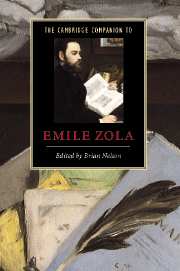Book contents
- Frontmatter
- 1 Zola and the nineteenth century
- 2 Family histories and family plots
- 3 Zola and the representation of society
- 4 Questions of sexuality and gender
- 5 Zola and contemporary painting
- 6 Zola and the art of fiction
- 7 Thérèse Raquin: animal passion and the brutality of reading
- 8 Nana: the world, the flesh and the devil
- 9 Germinal: the gathering storm
- 10 La Bête humaine: Zola and the poetics of the unconscious
- 11 Zola’s utopias
- 12 ‘J’accuse...!’: Zola and the Dreyfus Affair
- Further reading
- Index
6 - Zola and the art of fiction
Published online by Cambridge University Press: 28 May 2007
- Frontmatter
- 1 Zola and the nineteenth century
- 2 Family histories and family plots
- 3 Zola and the representation of society
- 4 Questions of sexuality and gender
- 5 Zola and contemporary painting
- 6 Zola and the art of fiction
- 7 Thérèse Raquin: animal passion and the brutality of reading
- 8 Nana: the world, the flesh and the devil
- 9 Germinal: the gathering storm
- 10 La Bête humaine: Zola and the poetics of the unconscious
- 11 Zola’s utopias
- 12 ‘J’accuse...!’: Zola and the Dreyfus Affair
- Further reading
- Index
Summary
Behind the scenes of fiction: Zola’s planning notes
Zola left to posterity a substantial collection of texts linked to the genesis of his novels. Commonly called the 'dossiers préparatoires' ['planning notes'], they provide direct insight into the creative process. It is highly likely that the novelist intended these files to be an exemplary illustration of the naturalist method. There was no desire on his part to keep the notes secret; on the contrary, he revealed the existence of some of them during his lifetime, so that some of his admirers, including Edmondo de Amicis and Jan Van Santen Kolff, found themselves in possession of the notes for L'Assommoir and Le Docteur Pascal. Zola no doubt intended to bolster his image as a serious novelist with little use for improvisation or imaginative invention. Beginning with Le Ventre de Paris, all the planning notes are composed in the same way, in four large sections. In a section entitled 'Outline' ['Ebauche'], the novelist gives a broad-brush indication of the setting, the plot, and the principal characters. In a section entitled 'Characters' he draws up a file on each of his characters, giving their main biographical, physical and psychological particulars. A section entitled 'Plans' usually includes a brief summary and two series of detailed plans in which Zola organises the narrative and descriptive material chapter by chapter. Finally, there is a section containing documentation based either on his reading-notes or the results of his fieldwork. This homogeneous set of documents gives the impression of a perfectly controlled process of creation founded on genuine knowledge. The planning notes seem to illustrate to perfection the two great principles of naturalist fiction enunciated in Le Roman expérimental: observation (as in the Notes) and experimentation (as in the Outline, in which the story is invented). The development of the work seems to coincide with the substance of the theory. This provided the basis for the legend of the naturalist writer.
- Type
- Chapter
- Information
- The Cambridge Companion to Zola , pp. 86 - 104Publisher: Cambridge University PressPrint publication year: 2007



